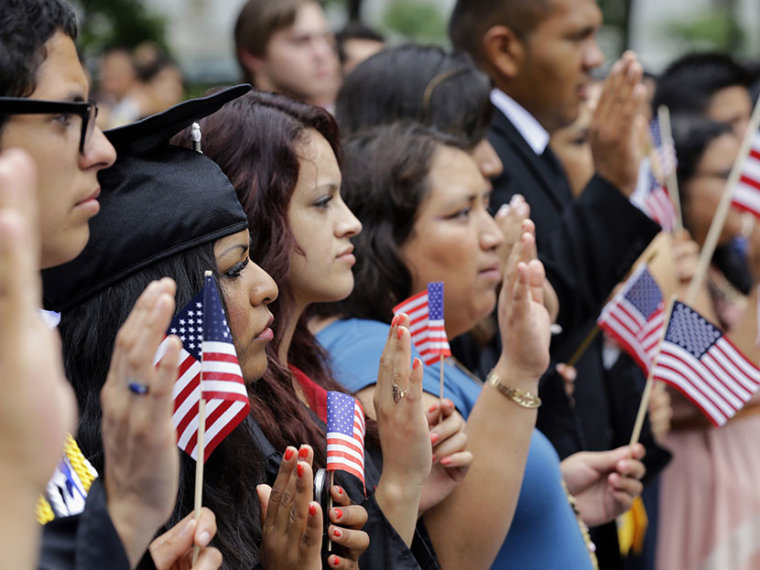Republican House members left a major huddle on immigration reform with vague plans to move forward on the issue, but little consensus on how to deal with the the 11 million undocumented immigrants in America today.
Participants told reporters after the meeting that leaders hoped to slowly move forward with a variety of small bills dealing with immigration enforcement, agricultural workers, and high-tech visas, among other areas. A vote on major legislation before the August recess seems unlikely. As for a path to citizenship–or even basic legal status–for undocumented immigrants, the party still needs to figure out its position. The Senate passed a bipartisan bill addressing all of these issues, and more and leaders are unwilling to support anything short of a complete package.
"Today was more of a listening session,” Congressman Raul Labrador of Idaho, who worked on a bipartisan immigration proposal before dropping out of talks, told reporters.
In a joint statement after the meeting, House leaders said members “don’t trust a Democratic-controlled Washington, and they’re alarmed by the president’s ongoing insistence on enacting a single, massive, Obamacare-like bill rather than pursuing a step-by-step, common-sense approach to actually fix the problem."
Several members suggested after the meeting that the House GOP might be able to get behind a more modest measure that would provide eventual citizenship to undocumented immigrants who arrived in the country as children. A bill that would have accomplished that goal, the DREAM Act, passed the then-Democratic House in 2010 despite overwhelming Republican opposition, and was then blocked by Senate Republicans.
"There were some voices of strong compassion for people in that situation [in the meeting],” Congressman Doug Lamborn of Colorado told reporters.
Others raised the prospect that some undocumented immigrants might be able to apply for legal status through guest worker programs or processes equally available to applicants outside the country.
“When we get to those 11 million people we will view how our earlier legislation affects them and then what to do with individuals who fall outside of that,” California Republican Darrell Issa said.
But beyond that, there wasn’t a clear consensus on whether most undocumented immigrants would receive even limited legal protections under a House bill–at least not without a long list of border security measures taking effect first. Given that Democrats and immigration groups have set a path to citizenship as an absolute minimum for their support, that’s a huge obstacle to a final deal.
“I think right now it's a question of where the majority is--whether the majority inside our conference is opposed to legalization of any kind, or whether they aren’t,” Iowa Congressman Steve King, one of the leading opponents of reform, said. “And right now I think it’s very close to 50-50.”
Republicans have lately expressed skepticism about almost everyone involved with immigration reform. Many say they‘re afraid President Obama and the Department of Homeland Security won’t enact tens of billions of dollars of new enforcement measures even though the White House has already presided over record deportations. But plenty of others are concerned about Speaker Boehner as well, saying they fear he might use a hardline immigration bill as a vehicle to negotiate a moderate compromise with the Senate in conference.
"He gave assurances it would be a conference committee that would accurately reflect the will of the House, of the Republican conference,” Congressman John Fleming of Louisiana said. He added he was not satisfied by their assurances: “How do you hold someone accountable for that? That’s a very vague, very nondescript, and subjective thing."
Immigration reformers are holding out hope that they can still convince Republicans that opposing a comprehensive bill would be a political disaster. National Democrats are running ads targeting a handful of Republican members with large Latino and Asian constituencies, and advocacy groups are working off their own list that includes members whose districts house large agricultural and high-tech interests. The White House is also weighing how best to pressure the House into acting without scaring off Republicans.
"It cannot be acceptable broadly and in the long term that immigration reform would be blocked because some minority of House Republicans is concerned about a primary challenge from the far right," White House press secretary Jay Carney said on Wednesday.
But the odds of passage have dimmed in recent weeks as Republicans increasingly embrace a political strategy focused on boosting white turnout in 2016 and House leaders show little appetite for another fight with their conservative wing.
